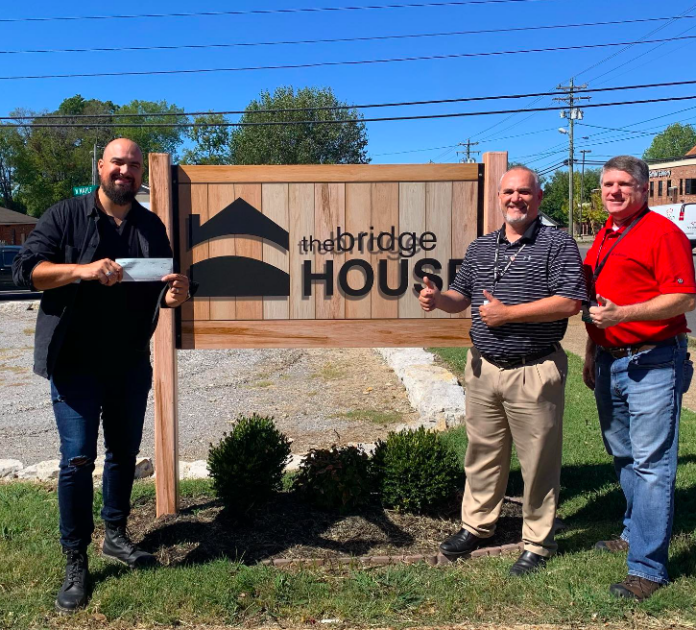A little over a year ago Bridge House opened in Lebanon. Affiliated with Bridge Fellowship Church, it came into being because members of the church wanted to do something to give back to the community, but the vision and birthing are all due to the organization’s Executive Director, John Widrick. It is his passion that has turned an idea to help foster kids into a reality.
Widrick came to Tennessee from New York after working with at-risk youth in his home state for 20 years as a Youth Pastor. He saw a hole in the foster care process locally and partnered with Bridge Fellowship Church to fill the need. Bridge House provides a safe place for children entering the Department of Children’s Services system to live until they are placed in foster care, and they work to provide support and stability for older kids who are aging out of foster care and have nowhere to go.
Initially, the road was bumpy. There was an idea, but no money. Then a man from Nebraska named Todd Talls heard about what Widrick was trying to do and believed in it so much that he donated $100,000 to Bridge House. That led to other large donors contributing.
The concept is very much like Isaiah 117 House, which was created initially by Ronda Paulson in Elizabethtown, Tennessee in 2015. AlLee Dauenhauer had the same idea in Murfreesboro in 2019 after experiencing the horrible conditions that foster kids faced while awaiting housing. Through online research, Dauenhaur found Paulson and worked to build an Isaiah House in Murfreesboro. Others are being built around both the state and the country. Bridge House is unique as they have added working with kids aging out of the system to their program.
Alec is one of the kids whom Bridge House has helped. Upon turning 18 and aging out of the system, he initially crashed with a friend until it became a bad situation. It was then that Alec was able to get in touch with Widrick through a mutual friend.
“Pretty much from the instant I got in touch with him, he found me a place to go,” said Alec. “Without the stable environment I received from the couple I moved in with I would not have graduated…I would not have been able to be in the military. I would not have had the courage or will or the mental capacity to even consider it.”
Through bridge house programming, these kids are provided with a support system that values them as people and provides them with what they need to succeed in life, so they can help others like themselves also succeed.
According to the Bridge House Facebook page, there are approximately 500 homeless teenagers in Wilson County. Many are just like Alec, older teenagers who have aged out of the system and have no place to go. These kids are less likely to stay in school and more likely to get involved with drugs, be exploited by human traffickers, and be incarcerated. The girls are more likely to get pregnant before they turn 21.
Determined to make a difference with these kids, Bridge House provides a dinner that they can come to every Thursday night to meet other kids like themselves and adults who support them in their efforts. Called the Meal Train, local community members provide the kids with healthy home-cooked meals.
“The meals [the community has] provided have been such a hit with the kids,” said Jennifer Gallahar, House Coordinator for the organization, on their website, “and it’s heartening to see them enjoying home-cooked meals. Given the success of the meal train and how much the kids prefer it over freezer meals, I have added more dates to [our] calendar. We would love for [community members] to sign up if [they] can. Additionally,…please feel free to spread the word among friends and family. It’s a wonderful way for us all to come together and serve these kiddos…We truly appreciate [everyone’s] generosity and kindness.”
Meals are not the only way the community has been involved. Local artist Jonathan Clark worked with Widrick to create special artwork for the space.
“I was commissioned (pro bono) to create five pieces of art to go in the room where difficult discussions with children and adults take place to help provide comfort,” explained Clark.
And that is only one of the donations that made the building of Bridge House possible. There are two bedrooms, a dining space and kitchen, office space, storage for food ,and supplies needed by the kids and the families supporting them.
Like Isiah 117 House, Bridge House works to reduce trauma for the children awaiting foster care placement, lighten the load for child welfare case workers, and ease the transition for foster families by supplying needed items necessary to support the child or children.
After extraction — often taking place in the middle of the night — the tired and terrified, often filthy, children are brought to this clean space where they are provided with clothing, food, a bath, a soft bed and love from volunteers. It makes the horror they experience after being taken from a home where they have often been abused or neglected a little less traumatic. Placements can take anywhere from a few hours until a few days, so the home lessens the stress and makes them feel wanted and taken care of.
Before Bridge House, many times the children were stuck in an office for several days, and case workers not only had to do the necessary paperwork and call prospective foster parents, but they also had to look after the scared and often dirty child. Now there are volunteers to care for the kids so the case workers can focus on placement.
When foster families come to collect the child, they often lack the supplies necessary to care for them, so Bridge House gives them what they need to get the process started, like clothing, food, car seats, and other necessaries.
“The Bridge House vision is for every child to have a permanent home where they are loved, respected, and empowered,” explains Widrick through their website. “To see birth, kinship, and foster families supported by their communities. To ensure children aging out of the foster care system to have the support that they need to thrive. The Bridge House also wants to increase community involvement.”
To learn more about Bridge House and ways to get involved, click here.


















